Just a heads up, some of the links on this blog are affiliate links. This means if you click and make a purchase, I may earn a small commission—at no extra cost to you! Think of it as a tiny thank-you tip for my endless search for the best health, wellness, and sustainable living products. Rest assured, I only recommend things I truly love or wish I could hug in real life.
Banish IBS Discomfort: Discover Natural Solutions You Can Use at Home
Jennifer Jane, BSN, RN
10/25/20249 min read
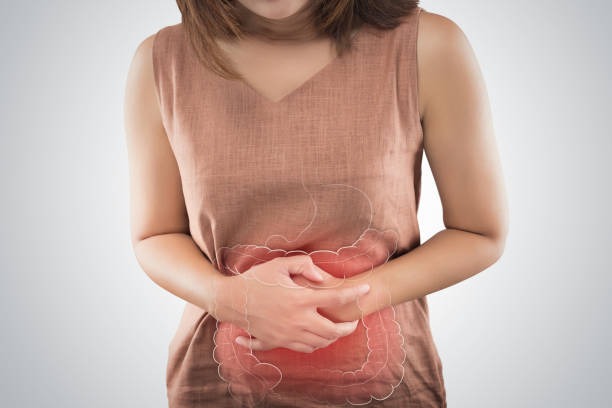

According to studies, up to 20% of the general population experiences Irritable Bowel Syndrome (IBS) (1). Symptoms of IBS can be uncomfortable and overwhelming, but luckily, there are many natural solutions you can try at home to help ease your discomfort and improve your gut health.
Studies show that a low FODMAP diet reduces IBS symptoms in 86% of people with IBS (2). Let’s explore this and more practical remedies to help you manage your IBS naturally and help you feel more in control of your gastrointestinal (GI) symptoms.
What is IBS?
IBS is a common disorder of the digestive tract that affects the colon, or large intestine. It often causes uncomfortable symptoms such as gas, bloating, cramping, diarrhea, or constipation. IBS is a chronic condition, but symptoms can often be managed by making changes to your diet and lifestyle (3).
Types of IBS: IBS-D, IBS-C, and IBS-M
There are three main types of IBS:
IBS-D (IBS with diarrhea) - characterized by frequent diarrhea
IBS-C (IBS with constipation) - characterized by infrequent bowel movements or difficulty passing stools
IBS-M (IBS with mixed bowel habits) - characterized by a combination of diarrhea and constipation
Understanding which type of IBS you have is the first step in identifying the best way to manage your symptoms.
Causes and Triggers of IBS Symptoms
IBS symptoms come and go and can flare up due to a variety of reasons. Triggers differ from person to person. Here are some common ones:
Dietary factors:
Figuring out your food triggers is key. No two people with IBS are alike, and each may be able to tolerate different foods. You may find that eliminating certain foods makes your gut feel great! You might need to avoid certain foods if they cause an increase in symptoms. For example, some foods, such as garlic or beans, produce more gas, and spicy or fatty foods can irritate your gut (4).
Stress and anxiety:
Stress is one of the most common triggers that make IBS symptoms worse. Stress and anxiety have a huge impact on intestinal sensitivity, secretion, permeability, motility, gut microbiome, and immune system response. Managing your stress and anxiety in healthy ways can positively impact your GI symptoms and the health of your gut (5).
Hormonal changes:
Hormonal shifts, such as during menstruation, pregnancy, and menopause, can affect GI tract motility and sensitivity and worsen IBS symptoms in some people (6).
Lifestyle factors:
Lifestyle factors such as a lack of physical activity or not sleeping well can increase your risk of developing IBS and make IBS symptoms worse (7).
Natural Dietary Changes to Alleviate IBS Symptoms
The Low FODMAP Diet for IBS Relief
One of the easiest and most effective ways to manage IBS symptoms is by avoiding foods that trigger symptoms. A low FODMAP diet is scientifically proven to help control symptoms for a large percentage of people with IBS. This diet emphasizes foods that are least likely to cause a flare in symptoms.
The low FODMAP diet is a restrictive elimination diet with three steps (8):
STOP: Stop eating high FODMAP foods for a few weeks
ADD: Every few days after that, you add one high FODMAP food back into your diet to find out if it causes uncomfortable gastrointestinal symptoms.
IDENTIFY: After introducing the high FODMAP foods that you want to test back into your diet one by one, you will have identified the foods that cause IBS symptoms for you and can avoid them while enjoying the foods that don’t cause discomfort.
It’s important to discuss dietary changes with your health provider or dietitian to make sure a low FODMAP diet is right for you and you follow it correctly, and to ensure you continue to get all required nutrients.
Explanation of FODMAPs and their impact on IBS
FODMAPs are types of carbohydrates: fructans, fructose, galactans, lactose, and polyols. These foods move slowly through the intestine, are absorbed poorly in the small intestine, and absorb water. Bacteria quickly ferment the FODMAPs, which causes gas, bloating, pain, and diarrhea in people with IBS (9).
What does FODMAP mean?
F = FERMENTABLE - foods that your gut bacteria consume and then produce gas
O = OLIGOSACCHARIDES - carbohydrates made up of a few sugars (examples: garlic, beans)
D = DISACCHARDIDES - carbohydrates made up of two sugars (examples: yogurt, milk)
M = MONOSACCHARIDES - carbohydrates made up of one sugar (examples: honey, pears)
A = “and”
P = POLYOLS - sugar alcohols (examples: sugar substitutes, prunes)
To follow a low FODMAP diet means to mainly consume the types of foods that are low in the above short-chain carbs because they are easier to digest and less likely to trigger IBS symptoms.
List of low-FODMAP foods to enjoy
Fruit: bananas, blueberries, cantaloupe, cranberries, dragonfruit, grapes, grapefruit, honeydew, kiwi, lemons, limes, oranges, papaya, passionfruit, raspberries, rhubarb, strawberries
Vegetables: bamboo shoots, bok choy, carrots, celery, cucumbers, eggplant, ginger, green beans, kale, lettuce, olives, potatoes, pumpkins, radishes, red bell peppers, spinach, summer squash, sweet potatoes, tomatoes, turnips, winter squash, yams, zucchini
Starches: gluten-free breads and cereals, millet, rice, oats, quinoa, tapioca
Dairy/Dairy substitutes: lactose-free milk, almond milk, oat milk, rice milk, cheddar cheese, brie, camembert, feta, lactose-free yogurts, non-dairy ice cream, sorbet
Nuts: in small amounts - almonds, macadamia nuts, peanuts, pecans, walnuts
Sweeteners: maple syrup, molasses, table sugar (sucrose)
Protein: eggs, meat
List of high-FODMAP foods to avoid
The types of carbohydrates that are FODMAPS: fructans, fructose, galactans, lactose, and polyols frequently cause an increase in IBS symptoms. Not all people with IBS are sensitive to the same foods. Following the FODMAP elimination diet can help you identify and avoid the foods you are sensitive to.
These foods commonly cause an increase in IBS symptoms:
Fructans (oligosaccharides): asparagus, barley, beets, broccoli, brussels sprouts, cabbage, chicory, garlic, okra, onion, rye, shallots, watermelon, wheat
Fructose (monosaccharides): agave, apple, mango, pear, high fructose corn syrup, honey, dried fruit, fruit juice
Galactans (oligosaccharides): beans, black-eyed peas, cashews, garbanzo beans, kidney beans, lentils, lima beans, pistachios, soybeans, split peas
Lactose (disaccharides): dairy milk (cow, goat, sheep), ice cream, yogurt, custard, cottage cheese, cream cheese, mascarpone, ricotta cheese, sour cream
Polyols: apples, apricots, avocados, blackberries, cherries, green bell peppers, mushrooms, nectarines, peaches, pears, plums, prunes, sweet corn, sweeteners (sorbitol, mannitol, isomalt, maltitol, xylitol) (10).


Incorporating Probiotics for Gut Health
Benefits of probiotics for IBS management
Probiotics are beneficial bacteria that help restore and maintain balance in your gut microbiome, which can help reduce symptoms of IBS. Probiotics help improve and heal the GI barrier, reduce GI pain and inflammation, and improve immunity (11).
Best natural sources of probiotics (e.g., yogurt, kefir, sauerkraut)
Fermented foods are an excellent source of probiotics and an easy, effective, and delicious way to incorporate natural, live beneficial microorganisms into your gut. Some of the best sources are:
Yogurt - with live, active cultures
Kefir - a fermented milk drink
Kimchi - fermented vegetables
Miso - fermented soybean paste
Sauerkraut - fermented cabbage
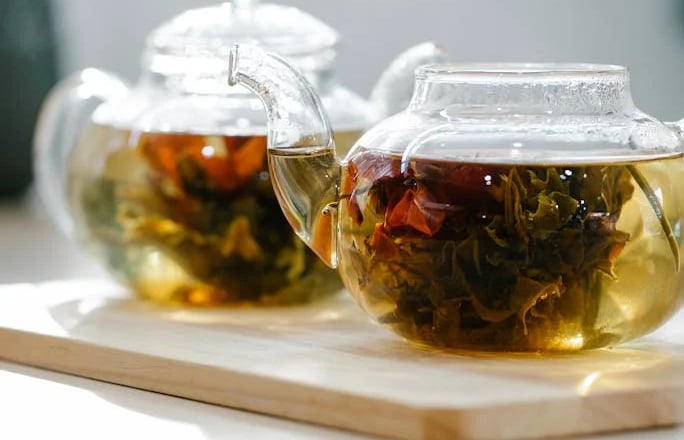

Herbal Teas for Digestive Comfort
A relaxing, steaming mug of herbal tea can help reduce stress and ease IBS symptoms in a simple, gentle way.
Suggested herbal teas
Some of the most effective and soothing teas are:
Peppermint tea - helps relax intestinal muscles and reduce cramping
Ginger tea - helps relieve digestive upset and nausea
Chamomile tea - is anti-inflammatory and calming, helping both your gut and your stress level
Green tea - helps reduce inflammation, aids in digestion, and promotes growth of good gut bacteria (12)
How these teas can soothe the digestive system
The act of drinking tea is relaxing and hydrating. Both help soothe the GI system and keep it healthy. Teas can help decrease inflammation, promote intestinal movement, settle the stomach, and decrease cramping.
Lifestyle Adjustments to Manage IBS Symptoms
Mindfulness and Stress Reduction Techniques
Importance of managing stress for IBS symptom control
Stress is a major trigger that increases IBS symptoms, and the more IBS symptoms, the greater the stress. You can see why finding ways to manage stress is crucial in stopping this cycle. Some helpful practices to help your mind and, therefore, your gut are:
Techniques such as yoga, meditation, and deep breathing exercises
Yoga - The stretching, gentle movements, and focus on calm breathing can help relieve stress and tension, yoga can strengthen your core, and improve digestion.
Meditation - Several minutes of meditation helps clear your mind of the pressures and busyness of life each day and focusing on breathing and relaxation can work wonders to ease anxiety and gastrointestinal symptoms.
Deep breathing exercises - Help to calm the body and mind and activate your body’s relaxation response, which can help reduce gut discomfort and stress (13).


Regular Physical Activity and its Benefits for IBS
A sedentary lifestyle can make IBS symptoms worse. Being active helps digestion, reduces bloating, promotes regular bowel movements, and improves overall health.
Recommended types of exercise
Gentle exercises that help to ease IBS symptoms are (14):
Walking - a readily available, easy, low-impact way to get your body moving
Swimming - a whole-body workout that is gentle on your body
Stretching - reduces tension, improves muscle tone
Connection between movement and digestive health
Exercise helps digestion by increasing blood flow to your digestive organs and stimulating intestinal muscle contraction. This helps move food through the GI system, helping to prevent constipation, gas, and bloating.


Home Remedies for Immediate Relief
Warm Compresses for Abdominal Pain
When you are feeling abdominal pain, cramping, or bloating, placing a warm compress on your belly for 10-20 minutes can be comforting and help ease your pain.
How heat can ease cramping and discomfort
Heat relaxes the abdominal muscles, easing pain from cramping and spasms. Heat increases blood flow, which can help improve digestion.
Essential Oils for IBS Symptoms
Some essential oils are well known for their gastrointestinal benefits and easing discomfort. Always choose organic and therapeutic-grade essential oils to ensure the purest quality. Talk to your doctor if you are pregnant or nursing before using essential oils.
Overview of beneficial essential oils
Peppermint oil can help reduce pain and cramping
Lavender oil is well known for relieving stress and creating a calm atmosphere. Less stress often leads to fewer IBS symptoms (15).
Methods of use
Try diffusing essential oils into the air using a diffuser made for this purpose. Always follow the diffuser’s recommended safety guidelines. If you have pets, make sure to check that the essential oils you diffuse are safe for your pets to breathe.
If using topically, dilute essential oils in a carrier oil, such as almond oil, before massaging it into your skin. Essential oils are potent, and a few drops are all you need.


When to Seek Professional Help
While natural remedies are effective for many, they don’t help everyone. It’s important to consult your healthcare provider before trying natural remedies or dietary changes to ensure they are right for you.
Signs that natural remedies may not be sufficient
If you experience severe symptoms, such as worsening abdominal pain, GI bleeding, or unplanned weight loss, or natural remedies are not providing you with enough relief from your symptoms, it is essential to seek professional care and guidance.
Importance of consulting with a healthcare provider
Living with a chronic condition is challenging, and it is vital to partner with your healthcare provider to plan your treatment according to your individual needs. Your provider will monitor your health and make sure your nutritional and treatment needs are being met.
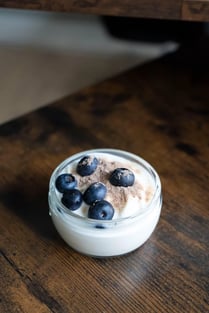
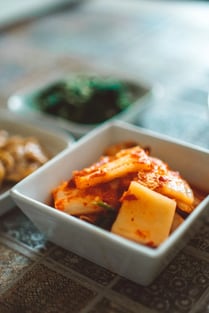
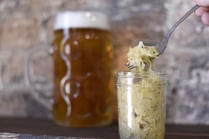



Bottom Line
Managing IBS is challenging but doesn’t have to be overwhelming. By making thought-out changes to your diet, incorporating probiotics daily, drinking soothing herbal teas, reducing stress, and increasing physical activity, you can help manage your IBS symptoms naturally.
With these natural home remedies, paired with regular care and guidance from your healthcare provider, you may be on your way to a more comfortable gut and improved digestive health!




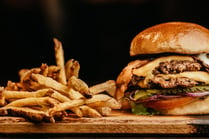





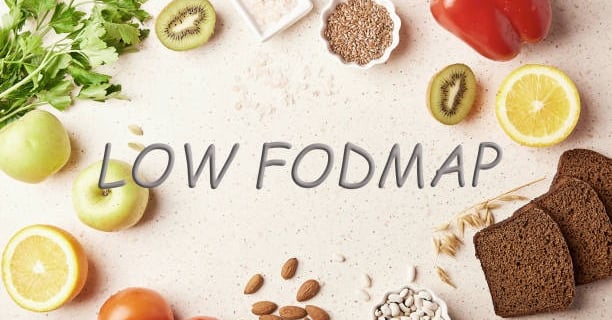





© 2025 Salo Content Writing LLC, all rights reserved
Join the Movement for a Healthier Planet! 🌿
Subscribe now and get your FREE Sustainable Living Checklist! Plus, enjoy weekly articles and delicious plant-based recipes straight to your inbox. Let’s make sustainable living simple and inspiring, one email at a time! 💚✨
